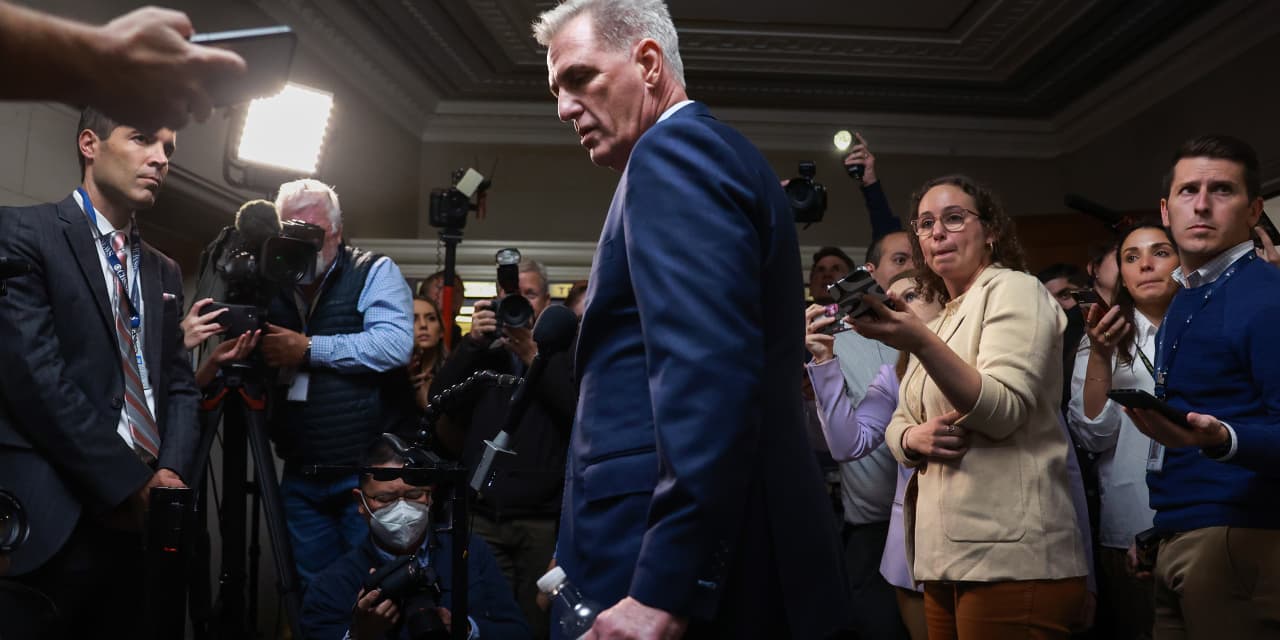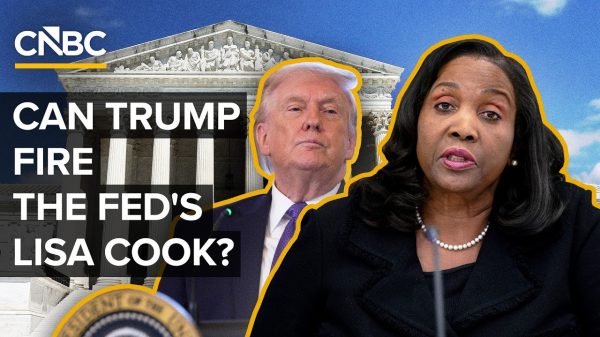House Republicans are attempting to try to break the impasse that has kept Congress paralyzed for a week. On Wednesday, a majority of their members voted to nominate Rep. Steve Scalise (R., La.) as the new House speaker. The House then went into recess without holding a vote to see if Scalise has enough support to secure the post.
Markets, desensitized to political chaos, are ignoring it. But what the House does will either tamp down or ramp up the Washington turmoil that affects everything from Federal Reserve Chair Jerome Powell’s interest-rate calculus to the course of two major wars. The politics of all these events are entangled in complicated ways, and Washington’s collective choice will send a major signal to the world about the U.S. government’s ability to act in the face of crisis.
Scalise was the No 2. under former House Speaker Kevin McCarthy (R., Calif.). He beat out Rep. Jim Jordan (R., Ohio), the nominee put forth by hard-liners, in a closed door vote. But it isn’t clear if Scalise will have enough support within the party to win the nomination when the House votes.
Congress has been at an impasse since eight Republicans voted with all House Democrats to oust McCarthy (R., Calif.) as House speaker last week. Republicans have a tiny 221-212 majority, which includes enough hard-liners to prevent any collective decision if that group sticks together. A speaker needs the support of an overall majority of the House, or 217 votes.
A failure to elect a new speaker would leave Congress under the limited control of Rep. Patrick McHenry, the acting speaker pro tempore. His powers to call votes on legislation are untested and are the subject of intense debate among congressional experts. Should no replacement be elected, that test may come as soon as Nov. 17, when the government will shut down again without further action. The U.S. government is spending money under a stopgap measure passed just before McCarthy’s ouster, but that authority is about to expire.
Meanwhile, the U.S. has major stakes in the wars in Ukraine and Israel, and could be drawn into conflict at a time not of its choosing, says Lori Esposito Murray, president of the Committee for Economic Development at the Conference Board, a business-focused think tank. The longer the Hamas-Israel war goes on, the greater the risks of international escalation, which would likely roil oil markets.
“And you lay that on top of the fact that we have a major budget crisis. We can’t get next year’s budget out of Congress. We lost a speaker over that historic dysfunction in Congress,” she said. That adds up to a business environment that looks riskier than relatively placid markets suggest.
Congress faces questions over whether it can pass new aid to Ukraine and Israel. For some Republicans, these issues are connected and straightforward. “As we have seen in Ukraine, failure to act decisively can prolong the conflict and compound the costs of war,” Senate Minority Leader Mitch McConnell wrote on Monday. But that view isn’t universally shared among Republicans. Jordan has been outspoken in his support for Israel, but opposes aid to Ukraine.
The politics may get worse before they get better. President Biden confirmed Tuesday that there are Americans among the hostages taken by Hamas in Israel. “It’s going to be impossible not for this to become a part of our political dynamic,” said Murray.
The Biden administration can take steps to support Ukraine and Israel even if Congress doesn’t act. Biden said last week that he was looking at alternatives to get funding to Ukraine, and overall, the U.S. contributes less to Ukraine than Europe, according to the Kiel Institute for the World Economy. The U.S. is already moving aid to Israel even without congressional action.
But what happens in Congress will send an important signal about whether the U.S. can act in the face of emergencies. There are overall majorities in Congress in favor of keeping government open and sending aid to Israel and Ukraine.
The House managed to overcome its divisions twice this year, once when it neared a breach of the debt limit and then backed off at the last minute and again in September when Republicans voted with Democrats to keep the U.S. government open temporarily despite the lack of a long-term budget.
Those moves speak to Congress’s longstanding habit of doing just enough at the last moment to forestall crisis. Should Republicans move relatively smoothly to a speaker replacement, that will be a sign that it’s business as usual, messy as that might be.
If Republicans are mired in chaos, that would suggest even the usual pessimism about D.C. dysfunction might not be negative enough.
Write to Matt Peterson at [email protected]
Read the full article here











